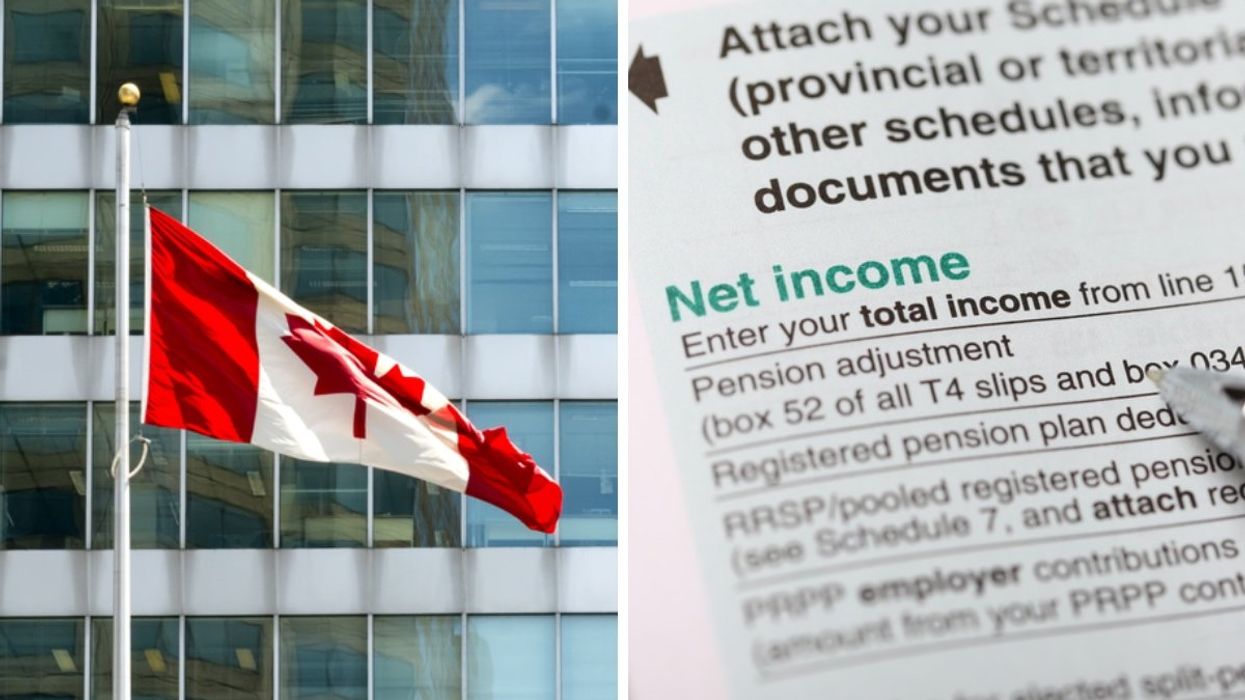Canada Income Tax Brackets For 2023 Have Changed — Here's What You Need To Know
Get up to date if you plan to do your own taxes.

The Canadian flag flying outside of a government building. Right: A closeup of a Canada income tax form.
Tax season is well underway and if you plan on filing your own income taxes for 2023, then it's important that you get up to speed on any tax changes implemented by the Canada Revenue Agency (CRA).
In fact, the CRA has announced the income tax brackets for 2023. Adjusted due to inflation and the rising cost of living, knowing your income tax brackets for the 2023 tax period is necessary for filing your own taxes in Canada.
According to the federal government, the taxable income thresholds have been recently reviewed and revised at an indexation rate of 6.3%. This change has been put into effect as of January 1 to increase the amounts of several deductions and tax credits Canadians may be eligible for.
Furthermore, Quebec residents can visit MTL Blog's overview of filing their income taxes with Revenu Quebec.
Here are all the pertinent details needed for filing your own federal taxes in Canada:
What are the tax brackets for Canada in 2023?
According to the Canada Revenue Agency, specific personal income tax and benefit figures are adjusted for inflation based on the Consumer Price Index data provided by Statistics Canada every year.
Adjustments to tax bracket thresholds, non-refundable credit amounts, and various other figures typically come into effect on January 1 of the respective year.
Here are Canada's tax bracket thresholds for 2023:
- $53,359 or less: taxable income above which the 20.5% bracket begins
- $53,359 to $106,717: taxable income above which the 26% bracket begins
- $106,717 to 165,430: taxable income above which the 29% bracket begins
- 165,430 to 235,675: taxable income above which the 33% bracket begins
How to file your own income taxes in Canada?
The CRA recommends filing your taxes online. Last year, almost 93% of Canadians filed their taxes online and the CRA has outlined a few of the benefits that come with filing your income taxes online, how to file your taxes online and what happens after filing.
The CRA recommends using its secure online system called NETFILE. These services are available for free, and using them can speed up the processing of tax returns, resulting in faster refunds. In fact, the CRA says that some refunds can take as little as two weeks.
To use NETFILE, you need to opt for one of the recommended free or pay-what-you-want filing software options provided by the CRA.
How late can I file my taxes in Canada?
The deadline to file your taxes in Canada is April 30, 2024, per the Canada Revenue Agency.
Other deadline dates for 2023 taxes in Canada are as follows:
- February 29, 2024: Deadline to contribute to an RRSP, a PRPP or an SPP
- April 30, 2024: Deadline to file your taxes
- June 15, 2024: Deadline to file your taxes if you or your spouse or common-law partner are self-employed.
What is the CRA penalty for filing your taxes late?
There are, in fact, penalties if you file a return late in Canada.
Per the CRA, if you file a return late with an outstanding balance, the government will assess a late filing penalty. The penalty is 5% of any balance owed to the CRA, plus 1% of the balance owing for each full month that the return is late, to a maximum of 12 months.
This article's cover image was used for illustrative purposes only.
- Canadians Can Receive $7,400 From This Government Benefit In 2024 ›
- The Canada Revenu Agency Announced Major Changes That Could Affect Your 2023 Taxes ›
- The Canada Revenue Agency Recommends Filing Your Income Taxes Online — Here's How ›
- Relevé 31 & Quebec's Solidarity Tax Credit — How To Claim When Filing Your Income Tax - MTL Blog ›
